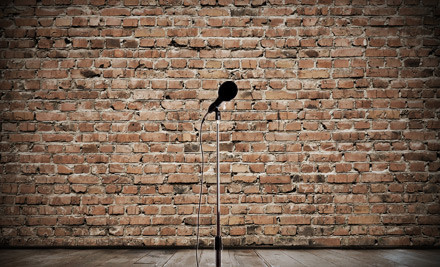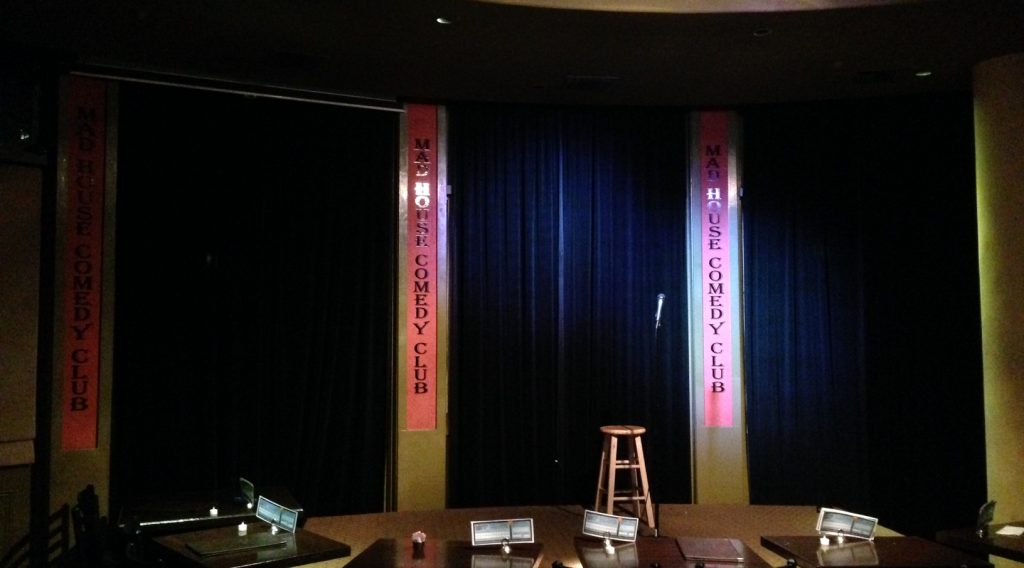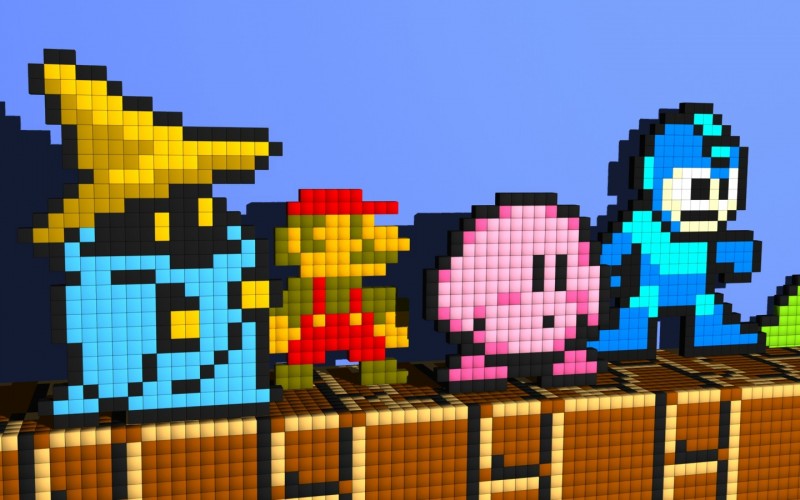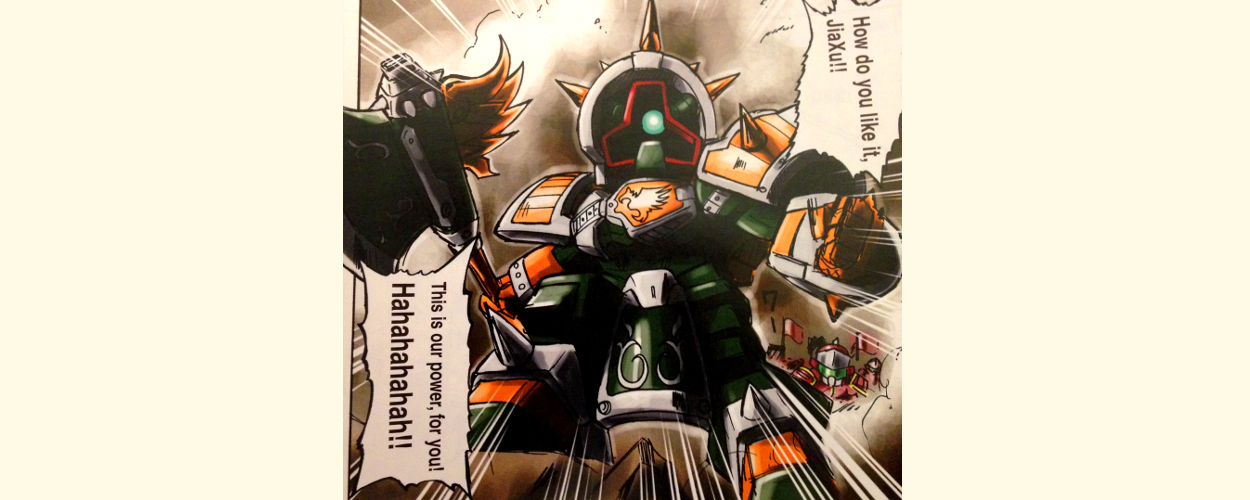The deep grip of fear began clenching my guts about 7 days before showtime. My palms would sweat whenever I thought about what I had signed myself up for. Indeed, actually placing the phone call to add my name to The List placed me under more duress than fist fights I’ve engaged in. Unlike those, where the rush and pain were over in the matter of a few minutes, I still had 7 days to think about what I had done, to really ponder the true terror of the possibilities. My future compressed itself into a singularity that would involve standing under stage lights and trying not to lose my cool while people looked on, expecting to be entertained.
“Um, hi. I would like to add my name to The List,” I said, and my voice inflection added the capitalization through the application of minor awe, just managing to avoid a waiver.
“No problem,” was the cool reply of somebody who had done this thousands of times before, and for whom all fucks to give had ran out a long time ago. I thanked the man and hung up. 7 days was all I had. 7 days to get prepped for something that, like most people, I had never even considered doing before. In 7 days, I was going to do stand up comedy.
When I found myself, 7 impossibly short days later, standing on the stairs outside of the Madhouse Comedy Club, the fear remained. Only now it had moved from the depths of my bowels and taken up residence in the penthouse at my throat. Stepping through the doors into the dimly lit room, the first thing that hit me was the size of the place. It wasn’t small per se, but it was certainly intimate. The mic piped through the sound system and throughout the venue, but the actual performance space was quite small, with a stage of perhaps 20 feet wide and maybe 8 feet deep. All told maybe 50 people could fit comfortably and, provided the comic could project their voice, would probably be able to hear the jokes without electronic assistance.
Other comics sheepishly added their names to a Reserve List. That would be the names called if the scheduled performers didn’t show, or there was extra time at the end. More likely, the people on the Reserve List would be shoehorned in when the next person up was in the process of finishing their beer. Watching them add their names to The List with shaking yet excited hands, made me feel a lot better. So I did my best to look like I belonged so I ordered the coolest drink I know – a scotch and soda. Now there are better drinks, but I didn’t want to be the pretentious hipster knob ordering the Old Fashioned, nor did I want to be that guy ordering the akvavit martini and seem like I was trying to be cool in the first place. Of course none of that matters, because nobody gives a shit about what distress the rookie is going through over his drink order. Instead they were busy focused on the dude on stage.
Getting the Joke
The first comic I saw was a writer for a show on Comedy Central, and within a few bits I was able to figure out which show he wrote for based on the style of the jokes. This of course is deeply confusing, since that style of comedy was associated in my mind with another person. It was almost like a reverse Being John Malkovich. In any event, a trained stand up comedian makes performing appear effortless. Their jokes seem natural, and they all seem to have a preternatural stage presence. But while a comedian can go up on stage and just tell some jokes, what they are really doing is an act. This act (also called a “set”) is far closer to being a one man show. There’s a flow that needs to be maintained, and transitions from topic to topic that can’t seem forced. It’s all designed to move the audience through the material that they have written. For a good stand up there is a structure that they are working within. It’s not all about going up and trying to be funny on the spot. Instead there’s a lot of writing and preparation that goes into creating a funny set.
So the first place smells like Walter White
had a cookout there.
Since I’m a giant nerd, when I first decided I was going to do this I felt an overwhelming compulsion to do research. I wasn’t about to go into something blind that could lead to this level of public humiliation. If you are going to do something like this it is always a great idea to do your homework first. If nothing else it gave me a sense of hope. Watching the TV writer work through his material gave me an appreciation for building a good framework, and once that framework is in place if something doesn’t work you know what to do instead. But structure is something you work out in the writing process. As a writer, that brought me a deep sense of relief even though I still got the sweats when I thought about going up on stage and eating shit. There were still a lot of things about this endeavor that could turn on me faster than bad Chinese food, but writing is a thing I do.
Against the Wall
The thing is comedy is all different for different comedians which means there are different styles of comedy. For example Dave Attell’s style is way different than Marc Maron’s. Dave Attell focuses more on the element of surprise with his jokes. So you might expect a joke like, “There’s a fine line between cuddling and holding someone down so they can’t get away.” But he tends to shy away from long-form bits. Maron instead comes from an alt comedy background, so his work is more story and anecdote based. This allows his jokes to work within the confines of the story he is telling. Of course, these are just a couple of examples of the different styles of comedy that a stand up can be doing. A really good stand up will actually use a variety of different styles and techniques while they are performing their set.

So before I could start writing, I needed to answer the question of, “who am I as a stand up?” Yeah, I know, it’s a pretentious thing to ask. Also many comedy people will tell you that somebody doesn’t really know who they are as a performer until they have been performing for years. But I didn’t have years, I had days. What I knew was that people around me tend to laugh at jokes I tell, and they tend to laugh the hardest at stories. I also tend to be pretty quick mentally and like to be playful, so anything I wrote could hopefully include that.
With this in mind, I went back into doing research, and what I discovered made me sad. On stage, stories by themselves don’t work. The funniest story you know, the one that gets people laughing every time you tell it, will die a slow, agonizing death under the bright lights. I watched this happen on stage the nights of my show. One of the other rookies went up and took the mic and launched into, what I would call a “bar story.” You know, those are the stories that you tell at the bar after your 3rd drink and everybody is having a good time. They’re the stories that start with a slurred, “Hey, did I ever tell you about that one time…?” He came up with a smile on his face, and a lot of energy and launched into a yarn he’d spun dozens if not hundreds of times before. Only when he got to the laugh lines, or the ones that make people ask, “no shit?” he was greeted with bewildered and increasingly hostile silence.
I’d never seen a crowd turn on somebody like that before. It’s not from malice or anything like that, but it comes from an apathetic boredom. They just don’t care and by telling the fine folks in the audience, those previously smiling people with their ever increasing blood alcohol levels, about this one time this cool thing happened to you and your circle jerk of friends – you are wasting their time. Worse, they become acutely aware of that inalienable fact at around the 10% mark of your set.
Thankfully, in the nights leading up to my set I did my research and didn’t build my set around a strange thing that happened. Better to save that sort of thing for print. Instead when building a stand up set it is okay to structure your set around a story, but the story must be secondary to the jokes. A great example of somebody that does this is Louis CK. He tells stories, but they serve as a vehicle for the material. So I wrote my set about the process of buying a house (short version – it sucks until it blows) and that’s a story that nobody cares about. But it’s full of a bunch of things that I happen to find funny and could write jokes for. The “story” was basically a way for me to shorten up the time I needed to set up the joke and give the audience context for the bit. For the poor bastard I watched onstage (for whom nobody laughed), this information would have maybe been helpful before he’d taken the plunge. Instead he metaphorically self immolated under the blinding glare of the stage lights. When the DJ finally played him off the stage, I’m not sure if he or the audience was more relieved that it was finally over.
As I watched I found my concentration drifting back into the safe confines of my preparation. While I had been writing jokes I found myself falling back into a strange, seemingly contradictory, habit. I wasn’t writing jokes so much as I was writing encounters. In a piece I did about writing for a D&D campaign I laid out the idea that D&D is very improvisational, and a good encounter should offer a setup, a resolution of some kind, and offer up a bit of space in the middle to screw around and see what happens. Writing jokes like this would allow me to do something that I very much enjoy doing – which is riffing.
Nope, we don’t need a living room for Christmas, I just remembered
I don’t much care for my family. Don’t need a yard for the dog either.
Goldfish are less of a commitment, and they’re a cheap funeral.
“Riffing” is a particular type of conversation. Basically, it’s where a comic (or a person just screwing around) will share things that they find funny within the context of a conversation. So when you are talking with your friends and you say something funny, and then they add to it and you add again, you are riffing. It’s one of my favorite things because it’s so damn fun.
The thing is you can’t just go on stage and riff. Well, unless you’re Billy Connolly who has been known to go on stage and basically riff for epic 4 hour stand up sets. Somebody neglected to tell one of the other comics, who confidently went up, told 3 jokes that imploded under the weight of the crowd’s derision, and said, “Fuck it, I’m doing crowd work.” I’ll give him credit, since his energy didn’t flag even for a moment as he started talking to the crowd and trying to elicit an interesting response. Basically, he was asking the audience to give him something to riff off of, and nothing really came of it.
When I wrote my set, I specifically made room to allow for these kinds of digressions. Although l did create punchlines to get to as well. My thinking was, that if it all went to shit then I can get to the laugh line and move along to the next bit. In the meantime, I could wander around inside my premise. Robin Williams was amazing at this, so I knew that with the right setup, riffing can work. When I built my set I had a bit about looking at houses and some of the (fictional) places I looked at. The structure was talking about things in my price range, and the joke was that I can’t have nice things. In between I gave myself a bunch of space to describe absurdist bullshit. Once the audience seemed like they were over the joke, I could quickly move on to something else.
…Eventually your hopes shrink and you stop looking for the perfect house
with the perfect features. Soon the only thing you’re looking for in a new house
are strong rafters to hang yourself from.
Then once I had my set, I practiced the shit out of it until I knew it front and back. The fear in my gut wasn’t going to allow me to fuck around and die onstage. Yet, because I had written my material to allow for improvisation I didn’t want to run it into the ground. If it was boring to me, then I wouldn’t find it interesting enough to riff off of.
At least that was the idea.
Under the Bright Lights
When my name was called I walked towards the stage like like one of the condemned, but you know, which a derpy smile on my face to hide the terror. For some reason I felt a compulsion to shake the MC’s hand as I walked onto the stage. There was a mic stand, and a thousand stand up specials flashed through my mind. I found myself doing a pantomime, an impression of what a real comic was supposed to do, and I knew that I wasn’t supposed to leave the mic on the stand. You never do that – it’s a dipshit rookie mistake. I pulled the mic off with an awkward motion so forced it came around to being casual again. Then, for reasons that I still cannot fathom and almost out of my conscious control, I moved the stand to the back of the stage while smiling and saying:
“Hi everybody. So this is my first time doing stand up,” I smiled while the audience cheered for me a second time, and for some reason I felt good. Like, really good. It was just me on the stage, and they were cheering. I figured that my comedic virginity would maybe buy me 30 seconds of time before the crowd turned on me like I was a wounded animal. The cynical part of my brain booted itself back up at that point and added. “But I make no promises. This whole thing could still end in tears and shame, like my wedding night.”
What they don’t tell you about stand up is that for the most part you can’t see the audience. The lights that illuminate the stage at most comedy clubs are attached to a low ceiling and beamed, lightsaber like, directly into your face. Beyond the lights in the inky blackness the crowd sits and watches you shamelessly. You can’t see them, but every one of them can see you/ They can watch you pace around the stage and see the first shiny beads of sweat appear on your nervous forehead. I quickly realized that my eyes were never going to adjust to the spotlights, and I would not be able to see the audience’s reaction to my material. Instead I would have to go by what I could hear coming from them. With that realization and a smile that looked way more calm than I felt, I launched into my set.
“If you decide you want this one, we’re going to open escrow, do an inspection,
punch you in the dick, and finalize your loan.”
Wait, what?
The first few lines were not the best I had ever delivered, and I will cop to that. I forced myself to stay calm, and forgot about the audience for the most part. It worked until I got to my first punchline, and then laughter erupted from the darkness beyond the edge of the stage. It gave me pause. “Oh right,” I thought, “there are people out there.” But at that point I was already too far into my material to find an exit and flee. But then something very strange happened – it got easier. All of the practice that I had put in was coming back to me. This was just an act, a routine. I knew the structures because I wrote them. I knew the jokes inside and out and against all odds they were working and the unseen audience was laughing.
I smiled, and meant it. You know one of those full body smiles, because I was having fun. The bundle of nerves and stress that had threatened to devour me from the inside out for the last 7 days now transformed into a raw energy. It was exhilarating in a way that was so unlike anything else I had ever done. Up on the stage when your stand up set is working, and the audience is laughing and you’re thinking of adlibs off the top of your head it’s like there’s a party in your brain and everyone is coming. I was telling a story, and I was making fun of the absurdity of it all, and the audience was coming along for the ride. They laughed and I improvised in the spaces I had built and we fed off of each other. The more they laughed the faster my brain began to fire and more and more of the nerves morphed into inspiration and jokes. But always the routine was my backup, my net – there to catch me if I took a wrong turn and fell.
As I was coming to the end of my 5 minutes it seemed as if I had been on stage for hours even as it felt like only a few seconds had passed. I had been so in the moment that I had lost any idea of how long a “moment” really was. Past the searing white lights a red light blinked on letting me know that my time was almost up. It let me know that I had made it through, and while I hadn’t killed, I sure as shit didn’t die. I finished my joke, thanked the audience, and I grinned like a daft idiot as I walked off of the stage in a euphoric daze.
Just 5 Minutes of Your Dignity
“Hey, that was good man,” said the MC as he shook my hand. My eyes were still a streaked dazzle, but now I recognized his voice as the one I had talked to all those days ago on the phone. He said my name and the audience clapped louder than the polite cheers from the start of the set. I took my seat and finished my drink with hands that shook, not from fear, but because they were soaked with adrenaline. I think I understand now why comics do it. Being on stage is thrilling. But the real secret is you really don’t know what is funny on stage until you are actually on stage. Getting time to try out your material on real people can be a rare thing, so getting up in front of those lights and standing up against the wall like a condemned man is the only way you’re going to get better.
For my part, I had gone into this as a sort of experiment. It was an experience to try for the magazine, perhaps a one off thing that might make for an interesting story. Instead, as the other comics congratulated me on my set as I left while my heart happily beat at 100 ticks per second, it stopped being a question of if I would do stand up comedy again. Instead the question was just, “when?”









